7+ Scientifically-Tested Supplements for Gut Health

There are a wide number of intestine conditions that can significantly spoil one’s life. What supplements for gut health are of real help? What needs to be introduced into your diet to relieve stomach discomfort, nausea, constipation or diarrhea, bloating, and the unpleasant feeling in the solar plexus? Supplements for gut health that we describe are safe and really work, so read on to find the answers to all these and numerous other questions.
1. Probiotics
Probiotics are strains of “good” bacteria that normally live in your intestine. Probiotics serve a variety of functions: although additional research is required, it is believed that they can help with digestion, improve the symptoms of diarrhea and constipation, inhibit the absorption of unnecessary fat, and even release appetite-reducing hormones. What’s more, there is a promising hypothesis that the use of probiotics can alleviate the symptoms of irritable bowel syndrome and inflammatory bowel disease.
Here are highly popular probiotic supplements for gut health that come from a well-known brand:
LactoBif Probiotics, 30 Billion CFU by California Gold Nutrition
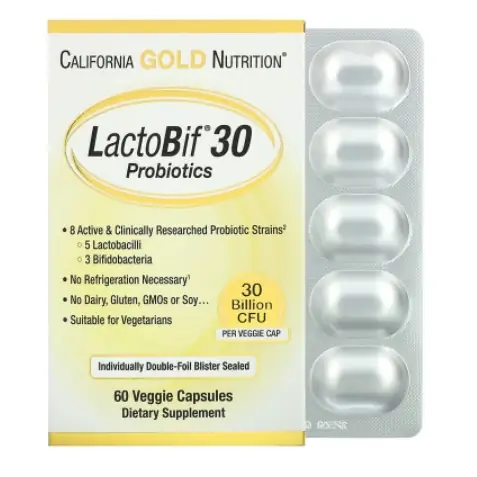
- 60 capsules each containing 8 probiotic strains
- 30 billion CFU (colony forming units) per capsule
- One of the better gut health supplements to use for weight loss
- The bacteria are protected from the action of moisture, light, and oxygen by double-foil blisters
2. Inulin
Inulin is a type of dietary fiber that cannot be digested in the human stomach and serves as a food (or prebiotic) for beneficial bacteria in the gut. What’s more, inulin can help you feel full (which is important if you want to lose weight) and prevents arteries-clotting cholesterol from being absorbed in the digestive tract.
Other beneficial properties that make inulin one of the better general health & gut supplements include delaying the onset of type II diabetes and stimulation of calcium absorption.
Sensitive persons who never used inulin before can sometimes experience such symptoms as flatulence and loose stools caused by the very first doses of this prebiotic. It is therefore recommended that you start from a very low dosage of inulin and slowly increase it to the levels recommended by the supplement manufacturer or your doctor.
Here is one of the most popular inulin supplements on iHerb:
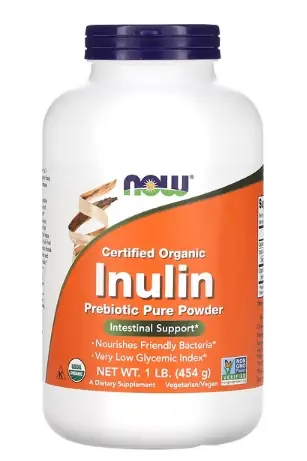
- 454 g (1 lb) of pure powder
- Organic, vegan & non-GMO
- About 162 servings (1 level teaspoon) per container
3. Chamomile
Traditional medicine has been using chamomile tea to treat anxiety and indigestion for thousands of years. Modern research confirms the beneficial properties of chamomile for gut health as its extract (in combination with apple pectin) was demonstrated to be effective for acute diarrhea in children.
Chamomile is usually well-tolerated, although pregnant or nursing women, as well as those who are allergic to ragweed, need to use it with caution.
Here is one of the highly popular chamomile teas that is suitable for everyday drinking:
Organic Chamomile by Traditional Medicinals
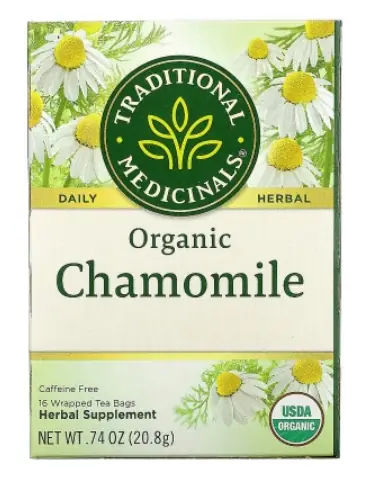
- 16 tea bags
- Organic & non-GMO
- Chamomile comes from Nile Valley, Egypt
- 1 tea bag (contains 1.3 grams of dry flowers) is enough for 250 milliliters (8 oz) of chamomile tea
- Can be used as a restore supplement for gut health
And here is one of the highest-rated chamomile extracts on iHerb:
Chamomile Flower by Nature’s Way
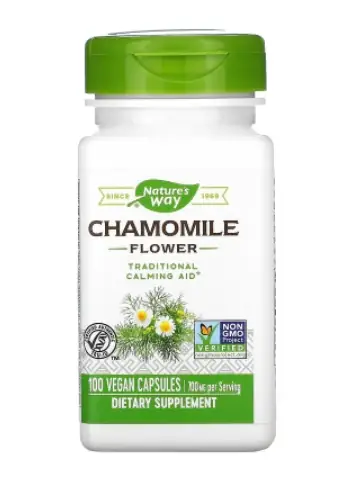
- 100 capsules
- Each capsule features 350 mg of chamomile extract
- Non-GMO & vegan
4. Ginger
An extremely popular spice, ginger root is known to be good for digestive health: it can be used to treat nausea (especially in pregnant women who suffer from morning sickness) and to promote emptying of the stomach to improve the symptoms of indigestion. What’s more, ginger contains bioactive compounds that have antimicrobial and antioxidant properties, which make it one of the best supplements for gut health and digestion.
If you want to introduce this spice-cum-supplement into your daily menu, this particular product has no rivals when it comes to affordability:
Ginger Root by Starwest Botanicals
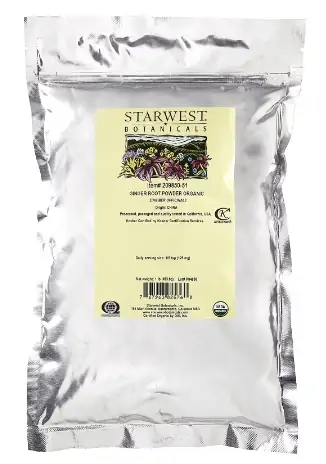
- 1 pound (454 g) of organic powder
- Country of manufacture: China
And here is powdered ginger root in the form of easy-to-use capsules:
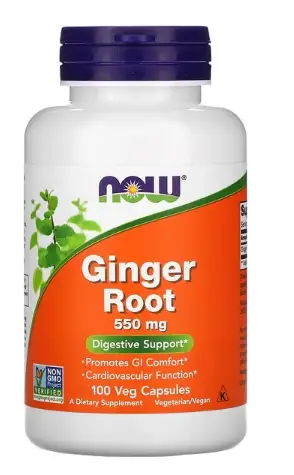
- 100 capsules
- 550 mg of ginger root powder per capsule
- Vegetarian & non-GMO
5. Digestive Enzymes
In some people the pancreas does not synthesize enough digestive enzymes (i.e., compounds that help to break down the foods), which leads to such symptoms as diarrhea, bloating, and gassiness and can also be the cause of malnutrition. While some foods (like kiwi and pineapples) naturally contain digestive enzymes and can help you avoid severe indigestion, it is dietary supplements that offer maximum ease of use.
Here is one of the top supplements for gut health and digestion promotion that comes from a reliable brand:
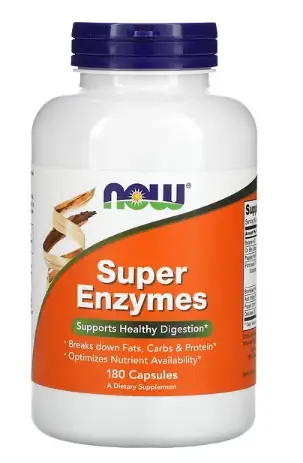
- Contains four major sources of enzymes: bromelain, pancreatin, ox bile, papain
- Contains enzymes that help to break down fats (lipase), proteins (protease), and carbohydrates (amylase)
- 180 capsules that need to be taken with a meal
6. Psyllium
Psyllium is another example of dietary fiber used for gut health. Psyllium relieves constipation by absorbing water and making your stool both bulkier and softer, which helps it to pass through the intestines. What’s more, due to its absorbent properties, psyllium can also be used as a treatment for mild diarrhea. The only drawback of psyllium is that it can slightly increase flatulence.
Additional benefits of regular use of psyllium include lowering glucose and cholesterol levels in patients with type II diabetes.
You can buy the best supplements for gut health and bloating on iHerb, the world’s leading online health products store:
Psyllium Husk Powder by Source Naturals
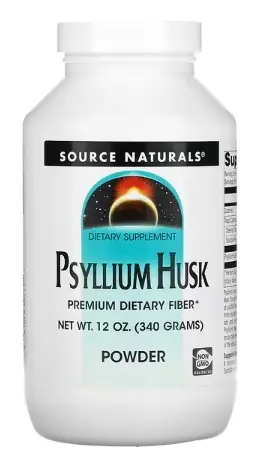
- 340 g (12 oz)
- 68 servings (one rounded teaspoon) per container
- Non-GMO
7. What Vitamin Helps with Gut Health
While vitamins are not generally believed to be of major help for gut conditions, recent studies show that there can be a relation between constipation and vitamin deficiencies.
Vitamin C & Folate (Vitamin B9)
In a 2008 study it was found that while children with constipation have a low plant foods intake (and, therefore, do not receive enough dietary fiber), they are also often deficient in vitamin C, folate, and magnesium. For this reason, if you suffer from constipation, these vitamins are reasonable to take for your gut health along with magnesium supplements and dietary fibers like psyllium.
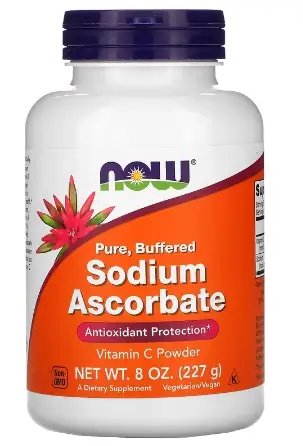
- 227 g (8 oz) of easy-to-use crystals
- While ascorbic acid (vitamin C) can cause indigestion, ascorbates (its salts) do not irritate the stomach and intestine)
- A twentieth of a teaspoon taken several times a day will be enough for high ascorbic acid plasma levels
Methyl B12, Methyl Folate (B9), and Vitamin B6 by Jarrow Formulas
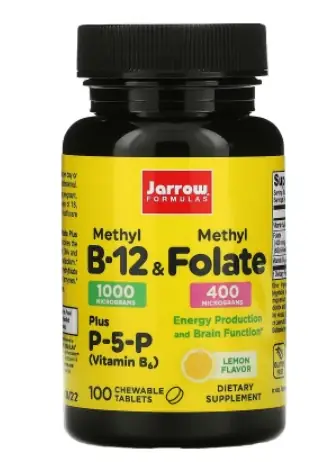
- Three highly bioavailable B vitamins in a single chewable tablet
- 100 tablets: enough for 3 months of use
- Well-known brand
High Absorption Magnesium by Doctor’s Best
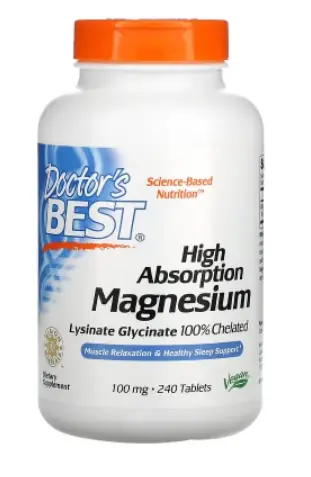
- 240 tablets; 100 mg of highly bioavailable magnesium per tablet
- Features no laxative effect associated with other magnesium forms
Vitamin D
A 2019 study established a strong connection between chronic constipation and vitamin D deficiency. While it is not likely that vitamin D can be used to treat constipation, the reverse is true: if you suffer from frequent episodes of constipation, your vitamin D levels might be depleted.
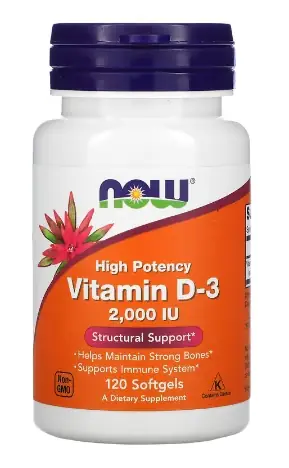
- 2,000 IU (50 mcg) per softgel
- 120 softgels: enough for four months of use
- D3 is dissolved in extra virgin oil
8. L-Glutamine
Glutamine is an amino acid that is most abundant in blood. It plays an important role in the transportation of nitrogen between tissues and is required for the growth and health of various classes of cells. It is also a precursor of glutathione, an important antioxidant. What’s more, tissues in the intestine require glutamine for their proper function, and there is a promising hypothesis that L-glutamine can help repair the lining of the intestines and improve the symptoms of inflammatory bowel disease.
It is believed that the normal daily intake of glutamine from dietary sources needs to be 3 to 6 grams per day. If, for some reason, you do not receive enough glutamine from food or your body’s current requirements in this compound are higher, you might need to use a dietary supplement.
Here is one of the most popular l-glutamine supplements for gut health and inflammation:
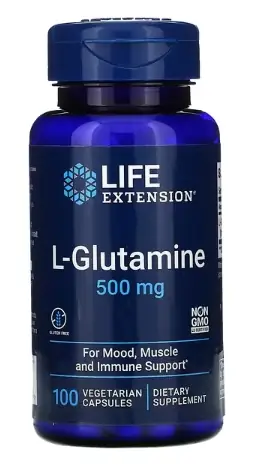
- 100 capsules
- 500 mg (0.5 g) per capsule
- Certified non-GMO
Now you know what supplements for gut health really work and can be used to improve the symptoms of your condition. Whatever products you use, never neglect to follow a healthy diet and fit some regular exercise into your daily routine.